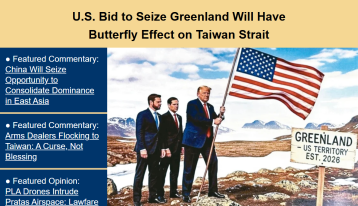
China Will Seize Opportunity to Consolidate Dominance in East Asia
President Donald Trump of the United States has declared that the incorporation of Greenland into the country is “irreversible.” Therefore, this issue is no longer a low-probability, idle topic, but will be a “black swan” event forcing a dramatic historical turn.
...read more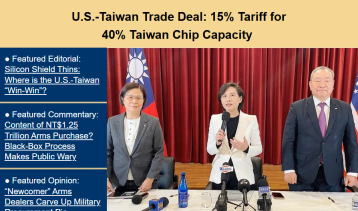
Silicon Shield Thins: Where is the U.S.-Taiwan "Win-Win"?
After eight months of negotiations, the outcome of the U.S.-Taiwan tariff negotiations has finally been revealed. On the surface, Taiwan secured the same 15 percent non-cumulative tariff treatment as Japan and South Korea, and obtained most-favored-nation tariff arrangements for certain automobiles, aviation components, and wooden furniture under Section 232. In exchange, however, Taiwan’s government must assist domestic companies in investing up to US$250 billion in the United States and provide credit guarantees to support financial institutions in extending loans to Taiwanese firms investing in the United States, also amounting to as much as US$250 billion.
...read more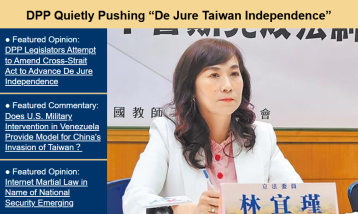
DPP Legislators Attempt to Amend Cross-Strait Act to Advance De Jure Independence
Democratic Progressive Party (DPP) Legislator Lin I-chin’s proposal to amend the Act Governing Relations between the People of the Taiwan Area and the Mainland Area—framed as an attempt at “de jure Taiwan independence”—ultimately collapsed. The proposal sought to rename the existing law as the “Act Governing Relations between the People of Taiwan and the People of the People’s Republic of China,” and to delete language in the original provisions referencing “prior to national unification” and other text reflecting the constitutional framework of the Republic of China, in an effort to reinforce, through legislation, the political narrative of “two states across the Taiwan Strait.” Yet this farce dragged on and ended hastily; meanwhile, DPP legislators who took part in this political drama found themselves contradicted by Legislator Lin’s own feigned performance, effectively “slapping themselves in the face.”
...read more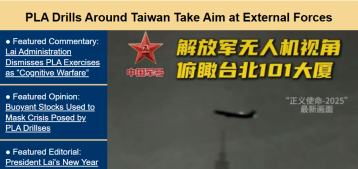
Lai Administration Dismisses PLA Exercises as "Cognitive Warfare"
The People’s Liberation Army (PLA) launched the “Justice Mission–2025” encirclement drills around Taiwan without prior warning, approaching Taiwan’s territorial waters and conducting live-fire exercises. In response, President Donald Trump of the United States downplayed the threat posed by the PLA drills, while the Japan maintained a low-key silence. What came as a surprise was that a photograph released by CCTV showing a PLA drone overlooking Taipei 101 unexpectedly became a topic of widespread speculation surrounding the drills. Yet the Ministry of National Defense (MND) claimed this was “cognitive warfare” and urged the public not to be manipulated—does it truly regard “exercises” as merely “acting”?
...read more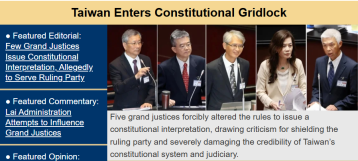
Few Grand Justices Issue Constitutional Interpretation, Allegedly to Serve Ruling Party
Five grand justices of the Constitutional Court handed down the earth-shaking Constitutional Judgment No. 1 of 2025, declaring in a single stroke that “the amendment to the Constitutional Court Procedure Act is unconstitutional and immediately void,” instantly reviving a paralyzed Constitutional Court at full strength. This sensational ruling is steeped in political overtones, forcibly reducing procedural justice to a mere technicality and effectively making clear that the Constitutional Court intends to act as the ruling party's best assisting hand. It not only shakes the foundations of constitutional governance but also drags democratic rule of law down with it.
...read more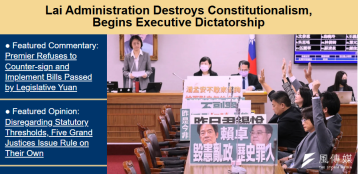
Premier Refuses to Counter-sign and Implement Bills Passed by Legislative Yuan
The plan by the administration of President Lai Ching-te to adopt measures of non-countersignature and non-implementation regarding the Fiscal Allocation Act disregards the majority will of the legislature and uses administrative power to nullify legislative authority. This not only creates a grave constitutional precedent but also intensifies confrontation between the ruling and opposition camps, offering no help in advancing national governance. From the Democratic Progressive Party’s (DPP) legislative caucus to its governing team, over the past year they have repeatedly accused opposition parties of destroying the Constitution and undermining governance. Yet those truly doing so are the governing authorities themselves. Or rather, the real question is: does the Republic of China Constitution still exist in the minds of the DPP administration?
...read more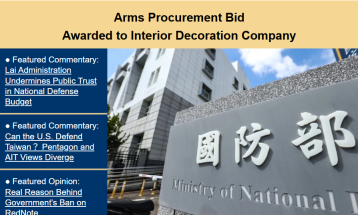
Lai Administration Undermines Public Trust in National Defense Budget
Whether to align with the United States or to strengthen Taiwan’s defense against China, President Lai Ching-te revealed in an interview with foreign media that Taiwan plans to allocate NT$1.25 trillion (about US$39.8 billion) in a special national defense budget. The special bill, however, was blocked for the second time by opposition parties during the Legislative Yuan’s Procedure Committee review on December 9. The next day, Lai urged the opposition to unite against external threats and allow the budget to proceed to committee review. Yet even before the words faded, a small interior renovation company in Tainan not only won a Ministry of National Defense (MND) NT$590 million (about US$18.8 million) tender for RDX explosives, but lawmakers further revealed that it is lined up for an additional nearly NT$900 million (about US$28.6 million) open-ended contract—amounting to roughly NT$1.5 billion (about US$47.8 million) in total business.
...read more
Taiwan Shifting from Openness to Closure
As Taiwan moves from openness toward restriction, the people must climb over layers of high walls—far more than just the users of Xiaohongshu (RedNote).
...read more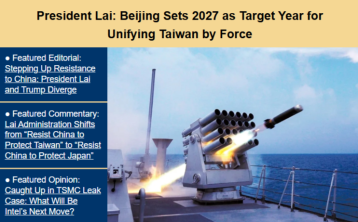
Stepping Up Resistance to China: President Lai and Trump Diverge
An opinion piece by President Lai Ching-te was recently published in The Washington Post, declaring that Taiwan will significantly increase its defense budget, promote all-people defense, strengthen asymmetric warfare, and explicitly position Taiwan on the front line of resisting Beijing's hegemony. In terms of domestic political effect, the op-ed does allow supporters to see that "we are brave," while conveying to the international community Taiwan's posture of "never yielding."
...read more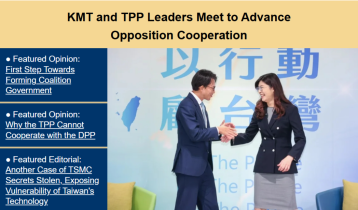
First Step Towards Forming Coalition Government
The meeting between Chairwoman Cheng Li-wun of the Kuomintang (KMT) and Chairman Huang Kuo-chang of the Taiwan People's Party (TPP) on November 19 became the most closely watched political development. Their dialogue is not merely a political maneuver; it also reflects changes in the new political structure and could mark the starting point for Taiwan's first move toward a “coalition government.”
...read more